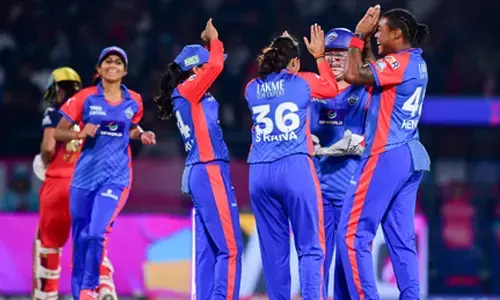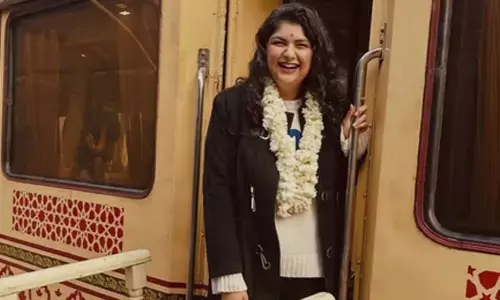Interview with Khaled Hosseini : Afghanistan's date with history

 After selling 38 million copies of his first two novels, writer Khaled Hosseini can be called nothing short of a phenomenon. The Afghani American first shot an arrow through readers' hearts with his international best-seller, The Kite Runner, a gut-wrenching story about a friendship between two Kabul boys that went deeply awry. Four years later his second work, A Thousand Splendid Suns, focused on the lives of two women and their loves�set against 30 turbulent years of various Afghan regimes.
After selling 38 million copies of his first two novels, writer Khaled Hosseini can be called nothing short of a phenomenon. The Afghani American first shot an arrow through readers' hearts with his international best-seller, The Kite Runner, a gut-wrenching story about a friendship between two Kabul boys that went deeply awry. Four years later his second work, A Thousand Splendid Suns, focused on the lives of two women and their loves�set against 30 turbulent years of various Afghan regimes.
Now, after readers have held their breath for an additional six years, Hosseini presents And the Mountains Echoed, a work told in multiple points of view. Lives are intertwined and overlaid: siblings who are separated early in their lives, a caretaker and his employer embark on an unusual relationship, a bohemian alcoholic mother and her disconnected, adopted daughter serve and volley, cousins who live in the U.S. and face guilt when they return to their homeland. Hosseini's hallmark themes of fallibility, regret, and reconciliation are present as well as his uncanny ability to generate poetic emotion.
The writer talks to Goodreads about the guilt he feels at being an exile, how he never knows where he's going when he writes, being a stay-at-home dad, and how his son is a big Goodreads user.
Goodreads: You cover so much ground in And the Mountains Echoed, as you have in previous books. How do you prepare or deal with writing about the times in Afghan history that you've not witnessed personally?
Khaled Hosseini: I came to the States in 1980, although I left Afghanistan in '76. I lived in Paris for four years, so I've been in the U.S. since the fall of 1980, shortly after the start of the Soviet War. The stuff that I write about that takes place in Afghanistan during the civil war, during the 1990s, the Soviet War, the Taliban, and so on, is made of a composite of vignettes and stories that I've heard from Afghanistan during that era, either from Afghans in exile who came from there and then told their stories here or from my own trips to Afghanistan since 2003, where I had a chance to sit down with people from all walks of life and hear the stories of what life exactly was like when militia warfare was destroying Kabul, when the Taliban came, what life was like when the Soviets were in Afghanistan. I've used those accounts to kind of provide a, hopefully, convincing, believable background for my stories.
GR: Do you approach the work like a journalist? Do you record transcripts, take notes, etc? KH: No, no. The thing is, I've never done research with the intention of writing, it's just things that I have absorbed. I went in 2003, for instance, on my own, and I just wanted to educate myself. I just wanted to gain sort of a human dimension to this new story, just for personal reasons. A lot of those stories stayed with me. Since then, I've gone to Afghanistan three separate times on a sort of official capacity with the United Nations Refugee Agency, and there I've had a chance to sit with people and conduct interviews with them somewhat journalistically, to get their perspective on what it's been like to be away from Afghanistan, what life's been like for them since they returned there for the fall of the Taliban, what are the challenges facing them now, so that I can use their stories to provide a backbone for my advocacy for refugees.
GR: Maybe that's why you choose to write about your country. Is it your way of giving back? KH: I wish I could give you such a noble answer. I could lie my way through it, but it wouldn't be truthful. But I write because I can't help it. You know, I'm intrigued by a story, by a character, by a given situation, by a conflict, and there's no letting go. I have to discover for myself why this is, and what's going to happen, and does it resolve? And what does it reveal about these people? It's the nuts and bolts of storytelling that has always drawn me to write. But with fiction, you write a story and then it takes on a life of its own and it has functions that exceed whatever intentions you had as a writer. Books can become windows into a world, bridge gaps between people�even though I have never set out with the intention that I'm going to bridge gaps between people in the West and the region where I'm from or educate anybody. That has never been my intention, but that's a byproduct of writing about that region and my country and what has happened there.
GR: You also take a new approach with this novel for you, working with multiple points of view. KH: I became interested in so many different characters and I saw how what had happened between the brother and the sister would have impact on so many different people that I just trusted to see where it went. It was like listening to a choir, but one voice at a time and then eventually the cumulative effect was this collective song sung by all these different voices. I had more fun writing this book than either one of my previous two because it was difficult. It was challenging; it really kind of pushed me.
GR: Your work is noteworthy for its high emotional tremor. Do you experience pain when you are writing your books? KH: If you don't experience the emotions as the person creating the story, there's no way another person is going to experience them either. I sincerely believe that. If you're not personally moved by your characters, if you don't feel something personal at stake in the fate of one of your characters, then there's no way that the reader will. So everything that the readers experience when they read my book, I have already experienced time and time over, because, you know, they might spend a week with my books, but I spend two years with these characters, three years.
They live with me every day and, you know, become part of my life. I come to care for them, and I come to care about what happens to them. And so when Baba dies in The Kite Runner, that was very painful for me to write. At multiple points in this novel, I felt something very personal at stake.














